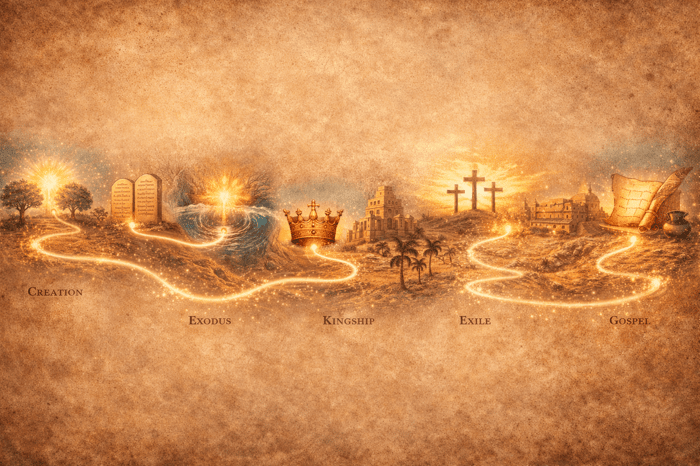Table of Contents
The word "firmament" is a captivating term that often raises questions for Bible readers, especially in the context of Genesis 1, the account of creation. Found in the Bible's King James Version (KJV), the term describes a significant part of God’s creative work during the six days of creation. But what exactly is the firmament? Let’s explore its meaning, role, and spiritual significance.
What Is the Firmament?
The firmament appears on the second day of creation in Genesis 1:6-8 (KJV):
"And God said, Let there be a firmament in the midst of the waters, and let it divide the waters from the waters. And God made the firmament, and divided the waters which were under the firmament from the waters which were above the firmament: and it was so. And God called the firmament Heaven. And the evening and the morning were the second day."
The term "firmament" is translated from the Hebrew word "raqia," which means something stretched out or spread thin. The concept likely refers to an expanse or a dome-like structure that God placed between the waters. In simpler terms, the firmament separated the waters below (seas and oceans) from those above (perhaps atmospheric or celestial waters).
The Role of the Firmament in Creation
1. Division of Waters
The firmament acted as a divider. On the second day, God separated the waters to create distinct realms:
- The waters below (seas and rivers)
- The waters above (possibly clouds or celestial elements)
This division marked the beginning of order within the created world, emphasizing God’s power in turning chaos into structure.
2. Called “Heaven”
God named the firmament “Heaven,” which often causes confusion. In this context, it refers to the visible sky or atmosphere where clouds form and birds fly (as later detailed in Genesis 1:20).
3. Foundation for Celestial Bodies
On the fourth day, God placed the sun, moon, and stars within the expanse of the firmament (Genesis 1:14-18). This suggests that the firmament also played a role in marking time and seasons and providing light to the earth.
Interpretations of the Firmament
Ancient View
In ancient times, many people believed the firmament was a solid dome. This perspective aligns with early cosmology, where the sky was thought to be a hard structure holding back celestial waters. This idea is consistent with descriptions of windows or floodgates in the heavens (Genesis 7:11) that opened during Noah’s flood.
Modern Perspective
Today, some scholars interpret the firmament as a poetic way of describing the atmosphere or the expanse of the sky. Others believe it represents God’s way of creating an ordered world understandable to early humans.
Theological Interpretation
From a theological standpoint, the firmament reflects God’s sovereignty and creativity. It reminds us that God is in control of both the natural and spiritual realms. The separation of the waters symbolizes God’s ability to bring structure and peace where there was once chaos.
The Firmament’s Spiritual Significance
The firmament is more than just a physical entity; it holds deep spiritual meaning:
Order from Chaos: The separation of the waters demonstrates God’s power to bring harmony to creation. This can inspire believers to trust Him to bring order to chaotic situations in their lives.
Revealing God’s Glory: The firmament, as part of the heavens, declares the glory of God. As Psalm 19:1 states:
“The heavens declare the glory of God; and the firmament sheweth his handywork.”
Connection to Eternity: By naming the firmament “Heaven,” God invites humans to look upward, both physically and spiritually, reflecting on His eternal nature and heavenly kingdom.
Biblical References to the Firmament
The concept of the firmament appears throughout Scripture. Here are some notable references:
| Verse | Description |
|---|---|
| Genesis 1:6-8 | God creates the firmament to divide the waters. |
| Genesis 1:14-18 | God places the sun, moon, and stars within the firmament. |
| Psalm 19:1 | The firmament declares God’s glory. |
| Ezekiel 1:22-26 | A vision of a firmament above the cherubim, reflecting God’s majesty. |
| Daniel 12:3 | The righteous are compared to the brightness of the firmament. |
Conclusion: Why the Firmament Matters Today
The firmament is a foundational concept in understanding God’s creative process. It represents His power to shape the universe with purpose and order. For modern readers, the firmament is a call to marvel at God’s handiwork in creation and seek His presence in both the physical and spiritual realms.
By exploring the firmament, we are reminded of the beauty and intricacy of God’s creation, echoing the sentiment found in Colossians 1:16:
“For by him were all things created, that are in heaven, and that are in earth, visible and invisible, … all things were created by him, and for him.”




